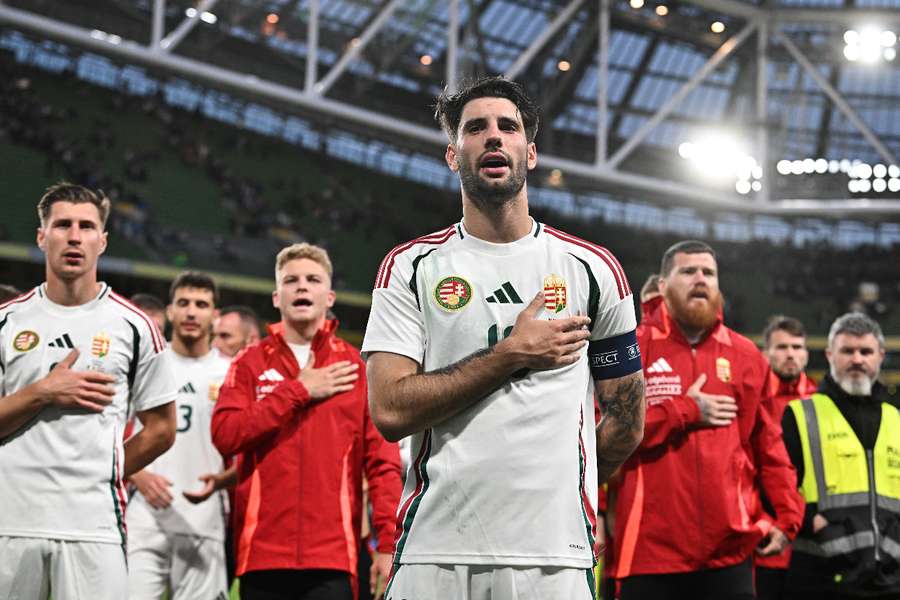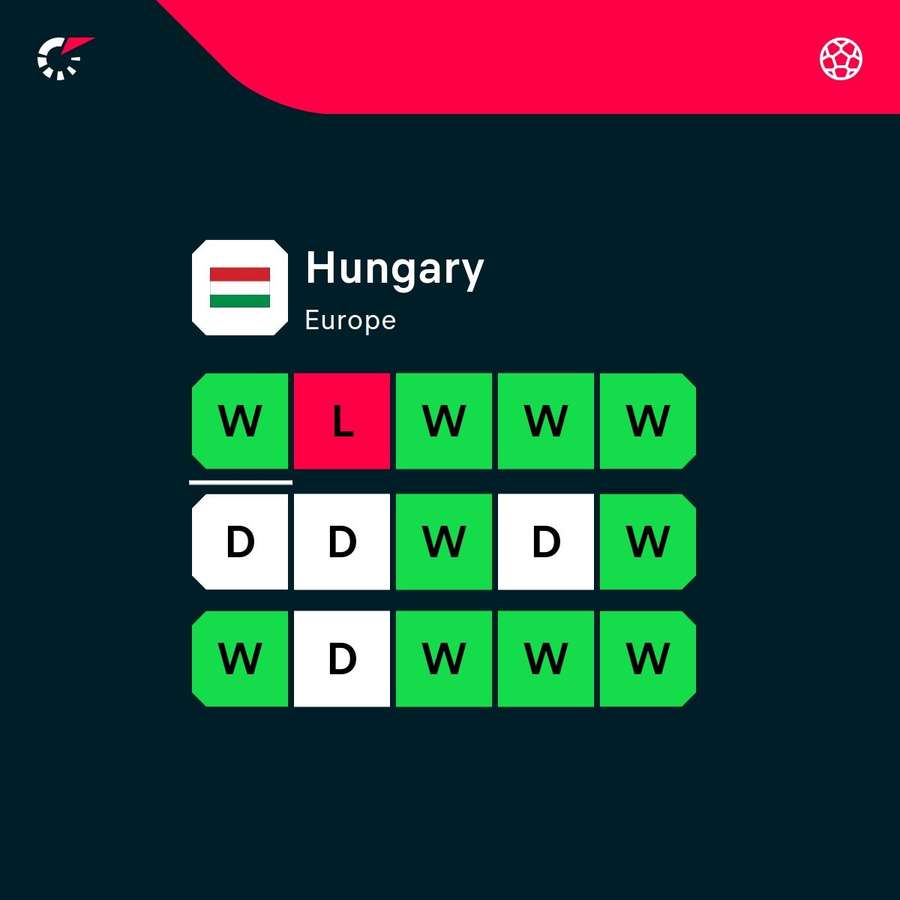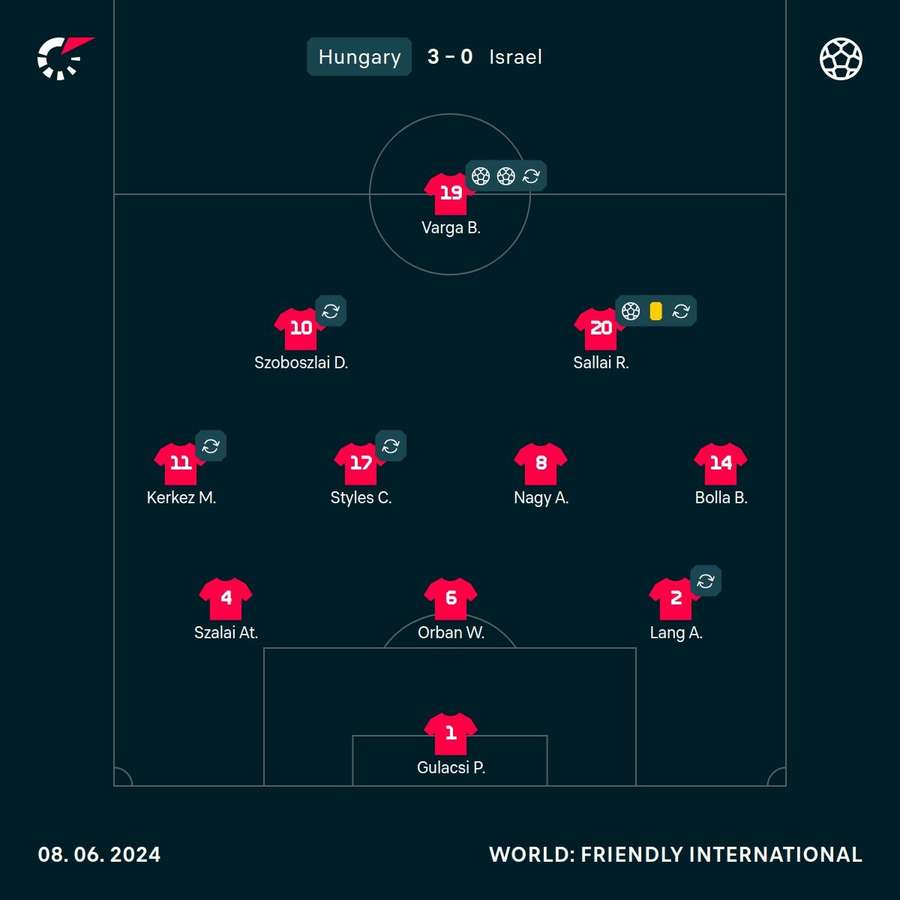EURO 2024 Preview: Hungary head to Germany as the tournament's dark horses

The Puskas Arena in Budapest was a venue for the last Euros, last year's Europa League final and will soon host the Champions League final (2026). Football's infrastructure in the country is flourishing, and the Hungarian national team have flourished with it, steadily evolving into a sophisticated and confident side.
That's shown by the difference between the last two qualifying campaigns. While the Hungarians qualified for Euro 2020 without having the ball most of the time, they have enjoyed 58% possession on average on their way to Euro 2024. Where other "smaller" national teams have long relied more on chaos and simplicity, Hungary have a clear structure, integrating new, tangible elements from the club scene into their game more and more with every match.
It is of course possible that despite all these positive signs, the Hungarians will disappoint. However, with the group they have and the recent results they've picked up against top sides, that seems highly unlikely.
Road to the finals

Hungary's qualifying campaign was historic in its own right.
The last time that they reached a tournament without the need for a playoff (the 1986 World Cup), only six players competing in Euro 2024 had been born - Luka Modric, Manuel Neuer, Jesus Navas, Giorgi Loria, Pepe and Cristiano Ronaldo. The last time they went unbeaten in qualifying (1966 World Cup), they had to play four matches instead of eight. The last time they qualified in first place having played eight matches (November 1981), it was in the very month that Mauritania abolished slavery.
That being said, their group always looked very winnable. Hungary were aiming for a third Euros in a row while the Bulgarians hadn't been to one for 20 years and the Serbs for 24 if you want to include when they were part of Yugoslavia.
However much one wants to demean the achievement though, it still doesn't change the fact that it's an achievement nonetheless. Suffering zero defeats is worth a lot, even if the Hungarians lost on xG in both of their games against Serbia and Montenegro.
A national hero of a manager
Imagine taking on the reigning World Champions, the reigning European Champions and Germany at your first Euros. Then imagine winning the hearts of every neutral by robbing two of these star-studded opponents of points outright.
Then imagine losing your dream of coaching at your first World Cup because of two mismanaged games against Albania, and then responding by beating England and Germany in the Nations League, giving the former their heaviest home loss since way back in 1928.
Finally, imagine being made a citizen by the president of a country you have lived in for barely 10 years, while chants of your name are heard from the stands every matchday.
Welcome to the world of Marco Rossi, quite possibly the most comfortable coach on the planet right now.
Rossi is not just a folk hero in Hungary but is also a favourite of the football hipster, a kind of counterpoint to the consumerist fan, for he is also one of the most dynamic national team coaches not only of the present but in history, who after 15 months in office, seriously considered resigning, but instead of handing in his notice, set about redoing everything.
The classic 4-2-3-1 that had relegated the Hungarians to a disgraceful fourth place in their Euro 2020 qualifying group in November 2019 became a 3-5-2 formation for 2020, the analytically-minded voices of the new generation, Zsolt Laczko and Istvan Beregi, began to exert more influence on the team in 2021/22, and the team, under Rossi's strong leadership, suddenly became a more blunt, brash opponent.
The 3-5-2 formation remained for 2022, but with a substantial infusion of elements of Simone Inzaghi's Inter and Gian Piero Gasperini's Atalanta. Yet the familiar Italian influences did not remain, as last year, the principles of Brazilian 'Dinizismo' - the football played by Fernando Diniz's Fluminese - were also added.
The result is just two competitive defeats since October 2021, ironically both to the Italians.
Dominik Szoboszlai the driving force
When Dominik Szoboszlai was seemingly forced off through injury after 57 minutes of the warm-up friendly with Israel, fans held their breath. The thought of another lost tournament for the prodigy of Hungarian football simply could not be borne by any of the half a million of his countrymen who had applied for tickets for the Euros. It wouldn't be exact deja vu - Szoboszlai missed the entire spring three years ago and just didn't recover in time - but it would still be a major blow.
Fortunately, Szoboszlai immediately assured reporters that he just had heavy legs and it wasn't an injury. Hopefully, then, nothing will deprive us of our highly anticipated tournament debut. I say "us" because Szoboszlai's emergence on the European international scene is indeed a major event. Already we are talking about the best Hungarian since the 80s, and already he is starting to approach the members of the 'golden team' of the 50s.
Few footballers, at the fresh age of 22, could have handled the burden of the captain's armband with such grace. Few footballers would have been able to carry the entire decimated national team on their backs in November 2023 in the way he did when he saddled Bulgaria and Montenegro with 13 shots and 17 successful dribbles en route to their first direct qualification for the Euros.
One of our consultants, tactical analyst and scout Abel Meszaros, likened Szobozslai's two-goal performance in the second half of the final qualifying game against Montenegro to Michael Jordan at the height of his fame, and that seems a perfect parallel. Szoboszlai, after all, already showed such a moment of solo brilliance in the autumn of 2020 against Iceland.
Since he first donned the captain's armband in November 2022, the Hungarians have lost just once, a friendly to Ireland. Never mind that he wasn't playing in the Liverpool starting lineup towards the end of the spring and last scored for the club at the end of January - the Hungarians know very well what they have in Szoboszlai: one of the most self-sufficient attacking stars on the planet, whose self-sufficiency is being used extremely effectively by the national team.
As a popular superstition in Hungary goes, players with small feet are destined to become great footballers. It was true for Ferenc Puskas, and it was true for many of his successors, of whom Szoboszlai is already the best.
Milos Kerkez on the verge of glory
For a 20-year-old, Serbian-born Milos Kerkez has done a lot.
At 16, he was practically kicked out by Rapid Vienna for his stereotypical Balkan temper, which led him to consistently kick teammates in training. By the age of 17, he was playing regularly in the Hungarian second division, despite the fact that he was nowhere near the physique usually needed for adult football. At 18, he was playing for AC Milan's youth after getting a personal call from Paolo Maldini himself. At 19, he was one of the most explosive defenders in the Eredivisie thanks to his great speed, taking on opponents with ease. And at 20, he's playing regularly in the Premier League.
In truth, Kerkez is not as much of a prodigy as it sounds. His first season at Bournemouth was erratic, to say the least, and his position in the national team isn't really unshakable either. This is due both to his temper and discipline, and competition in the form of veteran Zsolt Nagy, who scored 11 league goals last season.
On the other hand, with this player who himself admits that he suffers most from a lack of patience, one thing needs to be constantly reiterated: despite how much he has been through, he is still only 20, and even at Bournemouth he has won over the fans with his unbridled passion.
Tactics and probable lineup

Hungary's squad is a bizarre collection of players from across the Atlantic (USA) to the Mediterranean (Cyprus) to the Pacific (South Korea), but there is a clear indication of who has come to play in the starting XI and who is travelling to Germany as a backup.
While in 2016, before the tournament it seemed that Bernd Storck would use all of his players almost equally and the starting lineup was riddled with question marks, this time the opposite is true. Only goalkeeper Peter Gulacsi has to realistically fight for his place, purely due to a complicated knee injury and the form of Daniel Dibusz. Some experts see this battle as a 50-50 situation, while others are more or less sure of the return of the more experienced Gulacsi, who recently stood out in the Champions League against Real Madrid and returned to the national team in style against Turkey.
Another player in danger is Atilla Szalai, whose transfer to Hoffenheim and then his loan spell at Freiburg didn't work out. He too, however, improved his stock in March when he looked like he hadn't missed a step. Szalai has been heavily pressured by Marton Dardai for the left-centre-back spot, who waited a long time for an invitation to join the German squad until he finally took the plunge this January and said yes to his famous father Pal's native country.
The rest of the back row is clear. Although he doesn't speak Hungarian, Willi Orban is the leader in the middle of the defensive three and the de facto captain in Hungary's own half. He wins a lot of aerial duels and is also a factor in the attacking box, where Szoboszlai often finds him with his deliveries from set pieces.
On Orban's right, we can expect Adam Lang, who has grown over time from an erratic full-back into a quiet, responsible, economical defender. Lang has some competition from the ageing now 34-year-old star of the last Euros, Atilla Fiola.
At left-back will be Kerkez, and on the right side will be naturalised Frenchman Loic Nego, who has settled in nicely at Le Havre this season.
The midfield two is also a given. Adam Nagy burst onto the scene at Euro 2016 as a 20-year-old Ferencvaros player and is now well-travelled - although he hasn't roamed to entirely prestigious clubs, he's playing solidly as the less risky of the two midfielders in the national team.
Andras Schafer, on the other hand, represents the least appreciated piece of a functioning mosaic - an extremely complex player who's a very skilled dribbler - one of the best in Europe's top leagues - and someone likely to move to a bigger club this summer. He had an excellent season even with the relegated Union Berlin, and if he follows up his performances at Euro 2020, a transfer will almost certainly not pass him by. He has suffered a lot of injuries, so Hungary already know that English-born Callum Styles can fill in if it comes to that.
Szoboszlai, whose territory is closer to the left touchline from where he makes almost twice as many penetrations as he did at Liverpool, is very ably seconded by Roland Sallai in the other free position behind the striker, even to the extent that there have been games when he has been the more prominent figure.
Consistency has always been alien to Sallai, otherwise he wouldn't have boasted just four goals from 10.15 xG in the Bundesliga over the last two seasons, but if you decide a crucial match with Serbia and score twice away to England, you're going to play.
These two are simply fearless, together responsible for 37% of Hungary's shots in qualifying, and it's hard to see who else could step into their giant shoes. Maybe Euro 2016 discovery Laszlo Kleinheisler, who recently celebrated his 30th birthday in Split, Croatia.
At the tip of the attack, Marco Rossi was facing an awkward search for a successor to Adam Szalai. His all-over-the-field bully mentality always attracted the attention of defenders, and that can't be expected now. However, Barnabas Varga has been a complete revelation, everything Rossi could have wished for and then some.
An amateur until 25, he first made his name properly as the top scorer in the Hungarian top flight in the 2022/23 season for Paks and has now repeated that feat at Ferencvaros. He's not very tall but physical, even strong in the air, covers the wide spaces and combines well with the stars behind him, which is why he has scored twice as many goals in half of his starts as the much taller Martin Adam.
